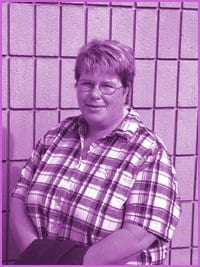Separated from the gay community for the past 15 years, Carol O’Dell is back, actively promoting women’s realities on The Lesbian Show on Vancouver’s Co-op Radio station. She calls herself an equalist and believes that when everyone becomes an equalist this world will be a better place. She’s already been told, in no uncertain terms, that she’s not a feminist.
Years ago, while volunteering to teach an arts and crafts class at the Vancouver Lesbian Centre on Saturday mornings, she was told she wasn’t political enough to run the class. That was after a woman registered with a little four-year-old boy. When the boy’s application was rejected, O’Dell protested.
“They said ‘it’s a lesbian centre, it’s for women only,’ and I said ‘you’re discriminating.’ There was a big kafuffle about it. They wouldn’t even let me become a member of the centre. They said I wasn’t a feminist. I said, ‘I guess you’re right, I’m not a feminist,’ and I walked out the door.
“I consider myself an equalist-equal opportunity for all,” she says now. “My personal view is that we’re all equal. We have to take equal responsibility for our actions and those actions have to be something that’s going to be positive for all people.”
Though O’Dell maintains she’s not a trailblazer, the 54-year-old’s life experiences suggest otherwise.
She went to her first lesbian bar in Calgary when she was 19 years old. “It was right across the street from probably one of the roughest, toughest biker bars in the city,” she recalls. “You went down this long, narrow stairwell to the bottom and there was a big, metal heavy door. It reminded me of something you would see in the old theatres with the little wicket and, this is not a joke, you literally knocked three times and this little thing slid open and you had to identify a member already inside that would come and vouch for you so you could get into this illegal basement bar-and find out they’d already run out of beer,” she chuckles.
In those days, there were consequences to living an openly gay life. “If your employer saw you coming out of a gay bar, you could bet that in a week, you were unemployed. They weren’t legally allowed to fire you but they could make your life miserable and you would never get a promotion.”
Life was different, then, she muses. “I did the whole corporate drag thing for years-the high heels and the skirts. We weren’t allowed to wear pants to work. And eventually we got to wear the old polyester blend pantsuits, but only occasionally-it was still frowned on. I started stuffing envelopes and licking stamps and eventually, 20 years later when I left the firm, I was Chief Financial Officer.”
More recently, living in suburbia with a partner and a hectic work schedule, the small-business accountant says she has lost touch. “I had to reconnect with the community. It wasn’t that I wasn’t keeping track of what was going on, I just wasn’t as vocal about it.”
Last summer, she connected when she volunteered to be one of two co-hosts of The Lesbian Show. “It gives me an arena. Anything I can promote for the community in general, and for women specifically, I will.” O’Dell has interviewed Roz Shakespeare about gaybashings, MP Libby Davies about politics, and the Vancouver Women’s Chorus. “I try to promote lesbian singers,” she notes. “We get their CDs sent to me so I can play them on air.
“Is the hard work over for women? No, I don’t think the hard work’s ever going to be over until people start to think like an equalist,” she asserts. “I’m not saying I’m not a feminist, because women still don’t have the same rights in a lot of cases-we’re still frowned upon.”
Her mother introduced her to “the hard work” in Grade 1, in Edmonton, in 1956, asserting her right to religious freedom. “You had to register which religion you were and you only had three choices, Protestant, Jewish or Catholic-you had to fit into one of those three- and it had to be your father’s religion,” she smirks, “because women didn’t exist.”
So O’Dell said she went to the neighbourhood church and her teacher told her that wasn’t good enough and sent her home to find her religion.
“Well, my mother marched back to the school and politely and firmly told the teacher it was none of her damn business what church we belonged to, that my education had nothing to do with my religious education and therefore they should just teach me how to add and subtract and read and write and leave the religion up to her. And if that wasn’t good enough for her, then fine, she would deal with the principal.
“And that was the end of it,” she smiles.
* The Lesbian Show airs Thursdays from 8 pm to 9 pm on Vancouver’s Co-op Radio station, CFRO 102.7FM.

 Why you can trust Xtra
Why you can trust Xtra


